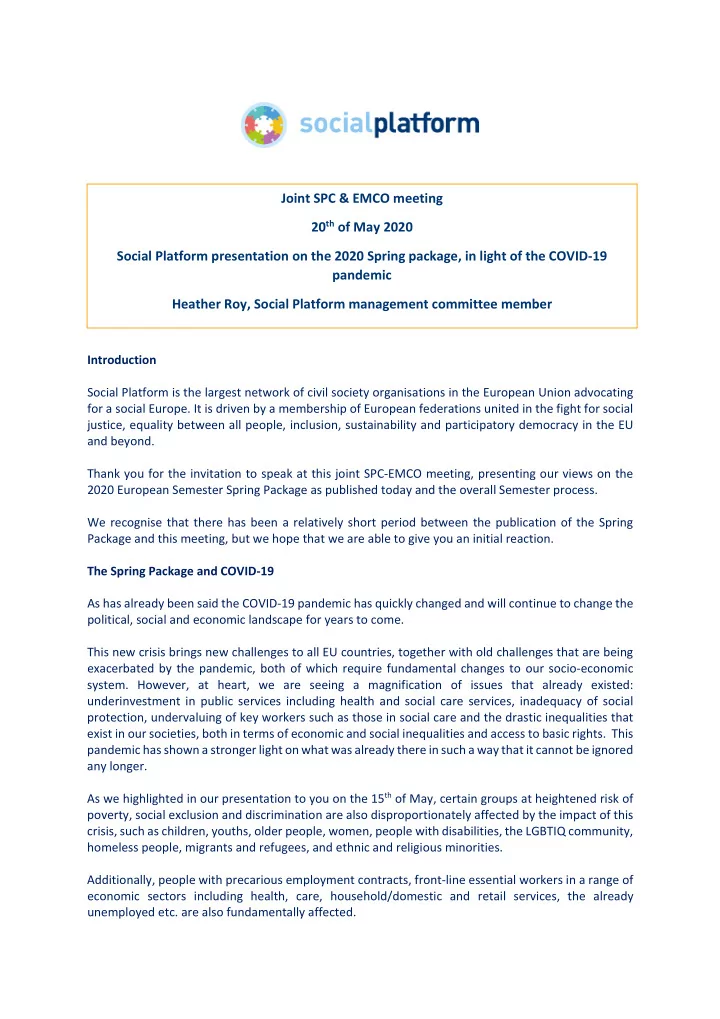

Joint SPC & EMCO meeting 20 th of May 2020 Social Platform presentation on the 2020 Spring package, in light of the COVID-19 pandemic Heather Roy, Social Platform management committee member Introduction Social Platform is the largest network of civil society organisations in the European Union advocating for a social Europe. It is driven by a membership of European federations united in the fight for social justice, equality between all people, inclusion, sustainability and participatory democracy in the EU and beyond. Thank you for the invitation to speak at this joint SPC-EMCO meeting, presenting our views on the 2020 European Semester Spring Package as published today and the overall Semester process. We recognise that there has been a relatively short period between the publication of the Spring Package and this meeting, but we hope that we are able to give you an initial reaction. The Spring Package and COVID-19 As has already been said the COVID-19 pandemic has quickly changed and will continue to change the political, social and economic landscape for years to come. This new crisis brings new challenges to all EU countries, together with old challenges that are being exacerbated by the pandemic, both of which require fundamental changes to our socio-economic system. However, at heart, we are seeing a magnification of issues that already existed: underinvestment in public services including health and social care services, inadequacy of social protection, undervaluing of key workers such as those in social care and the drastic inequalities that exist in our societies, both in terms of economic and social inequalities and access to basic rights. This pandemic has shown a stronger light on what was already there in such a way that it cannot be ignored any longer. As we highlighted in our presentation to you on the 15 th of May, certain groups at heightened risk of poverty, social exclusion and discrimination are also disproportionately affected by the impact of this crisis, such as children, youths, older people, women, people with disabilities, the LGBTIQ community, homeless people, migrants and refugees, and ethnic and religious minorities. Additionally, people with precarious employment contracts, front-line essential workers in a range of economic sectors including health, care, household/domestic and retail services, the already unemployed etc. are also fundamentally affected.
The role of the Semester in the current context The European Semester process is a key instrument in the current context: it is one of the key tools the EU has it its disposal to analyse the socio-economic situation at national level and to make recommendations for reforms to address existing and new challenges. Considering the impact of this crisis and the urgency of action, it is essential that these recommendations are the right ones. They must be people-centred, ensure that no one is left behind and build more secure social protection and active inclusion systems that are the foundation for more resilient societies that can better face crises in the future. Our views on the Spring package We welcome the recognition by the European Commission that there is the need for immediate reactions based on the current pandemic as well as longer term reforms needed to ensure the EU’s recovery. We also respect the fact that the European Commission has in effect extended the time frame for implementation of the 2019 country-specific recommendations (CSRs) in light of the current situation. We are very pleased to see that the European Pillar of Social Rights remains the compass for EU social policy-making. We are also pleased to see that the European Green Deal has not been discarded and we support the emphasis that reforms must move Member States towards the goals of the Green Deal. The application of the general escape clause of the Stability & Growth pact brings opportunities for Member States to invest in critical areas that may have been avoided before due to fiscal restraint. However, it is important the European Commission monitors how this clause is used and that it is in alignment with the social and economic needs in Member States and reinforces the principles of social investment. The recognition of the social impact of the current pandemic is very welcome and the acknowledgement of the specific impact on vulnerable groups – and the differentiation between them, as well as noting the very clear gender dimension in this crisis – is to be applauded. However, the picture is not fully painted. The social impact is predominantly described in the context of workers, but this is only part of the picture: there is more to people than their employment status. It is critically important that those who currently are not part of the labour market, including before the pandemic, are also taken into account to ensure that they have access to adequate income, health care and services. This means looking carefully at the universality of social protection schemes and avoiding, as is noted in general by the European Commission, gaps in the system. The European Commission notes rightly, that there could be a need to relax eligibility criteria where possible and this should be coupled with reductions in sanctions for those in the schemes as well so that no income is lost in this difficult period. The European Commission has stated – and we welcome that - that cooperation between social services, health care and long-term care may need to be reinforced. We would propose a change here: it MUST be reinforced. The continuing policy separation of social and health care is detrimental to the availability, accessibility, affordability and quality of social and health care services. We have seen in this crisis the importance of the social care sector and the need for continual investment. The social care sector must be seen on a par with our health care systems and the work of all in the sector seen as essential and valued and rewarded appropriately.
Recommend
More recommend